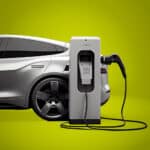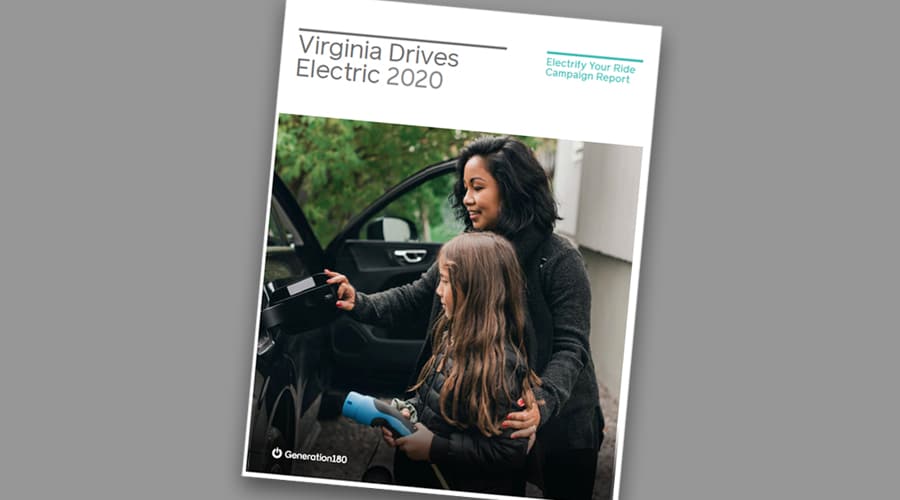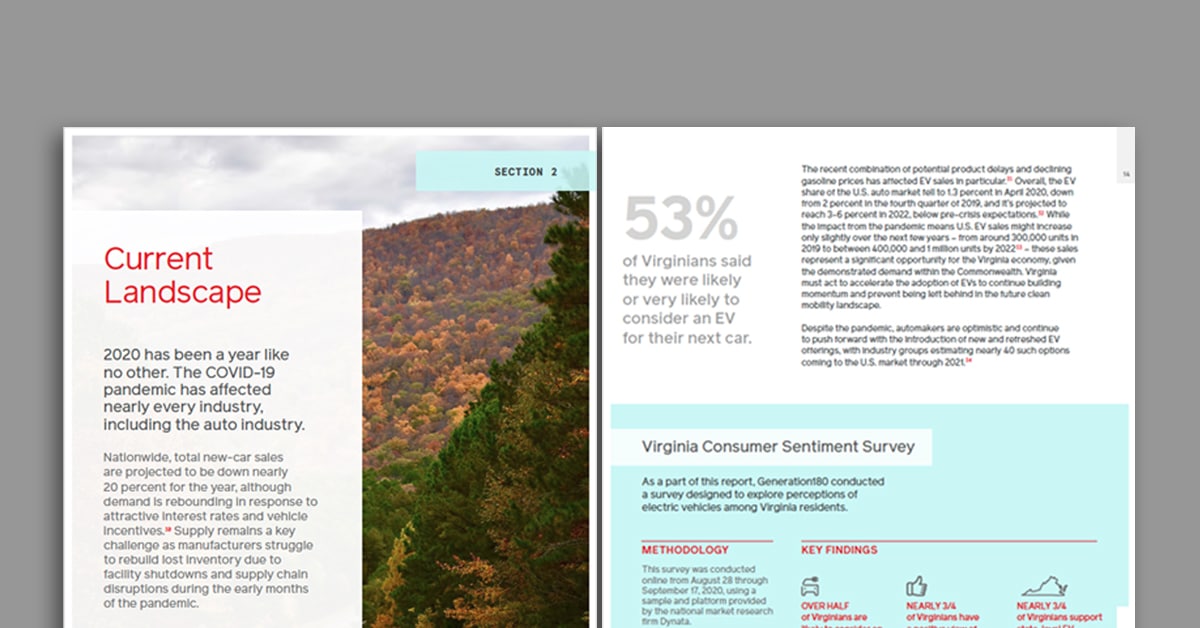Like many aspects of America’s transition to clean energy, the state of electric vehicle adoption varies widely by state. On one end of the adoption spectrum you have California, which accounts for nearly half of all EV sales in the U.S.; on the other end you have states that seem to still think electric cars only exist in sci-fi movies. Some states have smart, forward-thinking policies in place that are accelerating their progress toward clean transportation, while other states seem stuck in the last century.
That’s why we just published Virginia Drives Electric, a state-level report covering the status of EV adoption in Virginia—and identifying policies that can help move the Commonwealth forward.
Why write this report?
Generation180’s Electrify Your Ride (EYR) campaign exists to increase access to and availability of electric vehicles in states across the country, ultimately aiming to accelerate the arrival of a 100 percent clean energy future. We host educational events, partner with regional and national influencers, and tap local owners to become EV ambassadors within their own communities. When and where necessary, we also push for policies that will help drive adoption of electric vehicles as well.
Much of the time, the EYR campaign keeps busy doing the work of popularizing EVs among the millions of American drivers for whom switching to an EV today makes economic sense. But we also keep an eye out for key moments when smart policies could move EV adoption along much faster and more equitably. Virginia, a state in which Gen180 is both headquartered and active on the ground, is in one of those moments.
As we write in the report’s introduction, the past year has put Virginia on the map for clean energy leadership. In April 2020, Governor Ralph Northam signed into law the Virginia Clean Economy Act, making Virginia the ninth U.S. state or territory to mandate a move to 100 percent clean electricity. But while the Commonwealth has begun to tackle greenhouse gas emissions from electricity generation within its borders, it has yet to formally address emissions from the state’s growing transportation sector.
Enter the Virginia Drives Electric report: an effort to 1) raise awareness of the benefits and barriers to EV adoption and 2) drive policy change in Virginia. In addition to leveraging existing data to inform our findings, we collected new data as well. To round things out, we developed policy recommendations for Virginia’s lawmakers and governor in the coming year.
What we found
Here’s the report’s bottom line: Virginians are overwhelmingly in favor of clean energy and electric vehicle technology, new-car dealerships appear optimistic, but there are real barriers—particularly around available inventory, high upfront costs, and public charging infrastructure—that can and should be addressed by Virginia’s lawmakers.
We ran a representative survey across the state which found, among other things, that over half of Virginians said they were “likely” or “very likely” to consider an EV for their next car. We surveyed new-car dealerships and found that inventory was one of the most significant barriers to selling more EVs. We conducted a six-city comparison that revealed that the availability of EVs is 44 percent lower in Virginia cities than in comparable Maryland cities.
Many of these findings closely align with what we’re seeing around the country, including strong consumer interest in EVs and a stark inventory disparity between states that have adopted pro-EV policies and those that haven’t. While the report isn’t chock full of shockers, it’s helpful to provide an actual look at Virginia’s current EV landscape and to put the whole roadmap together: where we are, where we want to go, and how to get there.
What to do about it
The good news for Virginia lawmakers is that they don’t need to reinvent the wheel or pioneer groundbreaking legislative territory—other states have paved the way and shown that these policy solutions really do move EV adoption forward. The report recommends a trio of policies that would have a meaningful impact on electric vehicle adoption: adopting the “Advanced Clean Cars Program” vehicle standards, funding a point-of-sale EV rebate, and signing the Transportation and Climate Initiative MOU.
So where do you come into the picture? Here are three ways to get involved:
- Download and share the report with relevant people in your network—friends, social media followers, colleagues, local politicians, or organizations of which you’re a part
- Attend the virtual town hall Gen180 is hosting on 12/15 at 7 p.m. ET. Given coronavirus times, this will be a rare chance to engage directly with Virginia legislators
- Sign the ‘Going Electric’ pledge: It’s a simple, easy first step on your journey to driving electric and a way to show legislators your interest in a crucial clean energy solution.

















